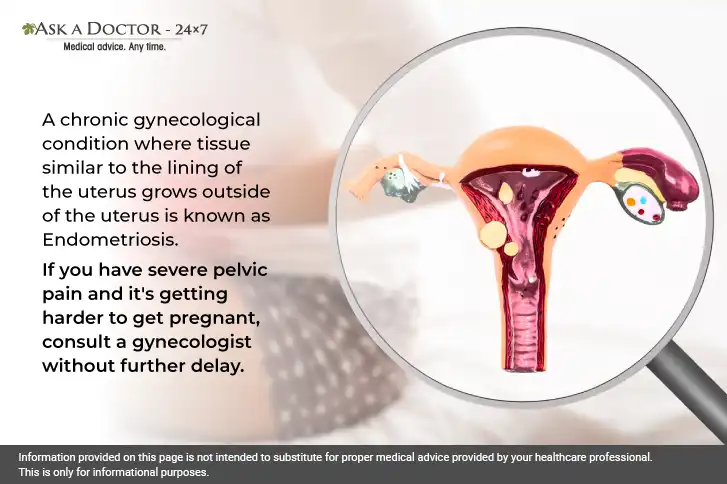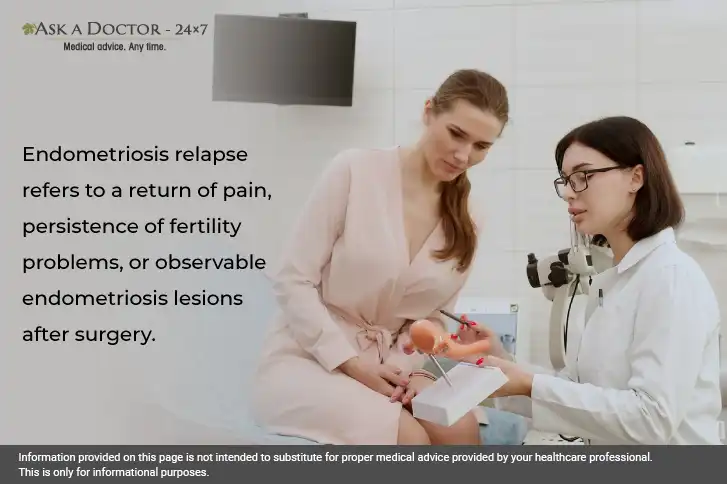What Is Endometriosis And How To Manage Endometriosis Relapse?
Do you suffer from heavy or painful periods? Are you facing difficulty in conceiving? It can be due to endometriosis, a condition in which tissues similar to the lining of your uterus grow outside the uterus. The tissues can envelop the ovaries, fallopian tubes, ureters, peritoneum, intestines, or diaphragm, leading to inflammation and scarring. Endometriosis is a common condition affecting up to 10% of women in their reproductive age.
What is Endometriosis?

Endometriosis is derived from the word “endometrium,” the inner lining of your uterus. Endometrial tissues growing outside the uterus do not shed during the menstrual cycle like the endometrial lining inside the uterus does. The build-up of abnormal tissue outside the uterus causes scarring, fibrosis, nodule formation, and fusion of your organs. This leads to discomfort and intense pain in your abdomen, pelvic area, or lower back.
What are the Symptoms of Endometriosis?
The cause is unknown. Some people don’t have any symptoms and it’s found accidentally during another investigation. Each person’s experience with endometriosis is different.
You may experience all or a few of the symptoms:
- Painful cramps during periods
- Pain in the abdomen or back area during or in between periods
- Heavier bleeding during periods or spotting in between
- Infertility issues
- Painful bowel movements
- Pain during or after intercourse
- Diarrhea or constipation during a menstrual period
- Lack of energy or fatigue
- Depression or anxiety
There is no relation between the severity of the condition and the symptoms. Some people have a few patches of scarring and still have intense pain while others have severe scarring and have no pain. The symptoms of endometriosis are often manageable with treatment.
Risk Factors for Developing Endometriosis
Factors putting you at high risk for developing endometriosis are:
- Having a mother, sister, or daughter with endometriosis
- Early onset of menstruation before 11 years of age
- Any defect in your uterus or fallopian tubes
- Short monthly cycles of less than 27 days
- Heavy menstrual flow lasting for more than 7 days
- Being infertile
Treatment to manage endometriosis varies based on the severity of your symptoms and whether you hope to become pregnant. A range of pain relief medicines such as NSAIDs to hormonal medicines like GnRH-analogues to suppress ovulation and periods are given. Fertility medicines or procedures are used for women who want to get pregnant. Surgery is recommended when medical treatment fails or if you have chronic or severe pelvic pain. The common surgical approach is laparoscopy (key-hole surgery), laparotomy, hysterectomy, or oophorectomy. However, for some people, relief is not permanent with surgery.
How To Manage Endometriosis Relapse?

Endometriosis can come back after surgery and has a recurrence rate of about 6% to 67% within one year. Factors increasing the risk of endometriosis relapse after surgery are:
- Having previous surgery
- Tender nodules in the pouch between the rectum and vagina
- Younger age at the time of surgery
- The severity of the lesions or scarring
- Some of the endometriosis tissue left behind during surgery can regrow with time
- Recurrence occurs stemming from de novo (new) cells
- Larger cysts present at the time of surgery
Recurrence of endometriosis may or may not be noticeable. You may experience new or increasing menstrual pain or pain in the pelvic region. When so ever, this happens, ask a specialist without delay.
Management of Endometriosis Relapse
Hormonal therapies post-surgery reduce the risk of recurrence but symptoms recur upon discontinuation. Hormonal contraceptives such as
- Oral medications, vaginal rings, or patches
- Gonadotropin-releasing hormone (GnRH) receptor agonists
- Progestin-only medications
- Testosterone derivatives
- Aromatase inhibitors
It would be best if you take hormonal therapy for a long time which can have risks and side effects. Discuss the best course of treatment with your doctor. You can also Ask a Gynecologist online at Ask a Doctor 24x7.
Conclusion
It has been found that conceiving after surgery helps in preventing relapse of endometriosis. If you wish to be pregnant after surgery, talk to your doctor about your options and how to prepare for it.
It is important to follow your doctor's post-operative guidance and schedule regular follow-up appointments to look for signs of endometriosis recurrence You can Ask a Gynecologist to learn more about endometriosis or book your consultation at Ask a Doctor 24x7 online.
Recently Answered Questions Related to Endometriosis
- Is Endometriosis And Numbness In The Inner Leg And Sole Related?
- What Does My Lab Test Report Indicate?
- What Does a Negative Blood Test For Pregnancy With a Sac In Uterus Indicate?
- Suggest Any Other Treatment Than IVF To Become Pregnant
- Have Endometriosis, Taking Alesse For Controlling Pain. Bright Red Spotting, Passed Large Clot, Not Decreasing. Why?
- Will Taking Entocort Cause Headache?
- Is IUI Best Option After Diagnosis With Cyst On Left Ovary & Block On Left & Right Fallopian?
Disclaimer: Information provided on this page is not intended to substitute for proper medical advice provided by your healthcare professional. This is only for informational purposes.
Ask a Specialist
Recent Questions


